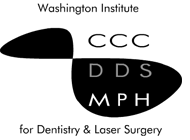|
||||
Alternative Medicine
 What's Alternative Dentistry?
What's Alternative Dentistry?
 Why You Need the Facts
Why You Need the Facts
What's Alternative Dentistry?
Books on alternative medicine fill the shelves at the local bookstore. Authors, gurus, doctors and "healers" work the talk-show circuit. Late-night television infomercials pitch the latest vitamins, herbs, diets and exercise programs. More and more, alternative medicine fights for your attention, often disparaging traditional Western medicine. What does it all mean?
In dentistry right now, the concept of alternative dentistry centers on alternatives to the array of traditional pharmaceuticals and microbial techniques used by clinicians. While not all claims are accurate and few may turn out to be dangerous, some alternative therapies have merit. But if you are considering any type of product or treatment that will affect your mouth, it is important to discuss it with your dentist first.
Why You Need the Facts
"It is important to have all the facts, and always check with your dentist before you take any medications," says Academy of General Dentistry spokesperson Eric Shapira, DDS, MAGD. Often, there can be reactions between prescribed and herbal medications, so it is particularly important to get your dentist's advice if you are currently on any prescription medication.
Some dentists have embraced a holistic approach to treatment, meaning that the mouth is treated in balance with the entire body. For example, it has been found that disease-causing bacteria in the mouth can contribute to stomach ulcers or heart problems. But a holistic approach does not necessarily mean alternative, which generally refers to Oriental herbal medicine. Dr. Shapira stresses that herbs and vitamins, though sold as beneficial "natural" cures, could have side effects. Always know what you're taking. As Dr. Shapira says, "Herbs are drugs, and vitamins taken in excess are drugs, as well. Be careful."

Original content of this reprinted with permission of the Academy of General Dentistry. © Copyright 2007-2009 by the Academy of General Dentistry. All rights reserved. Read the original article here.







